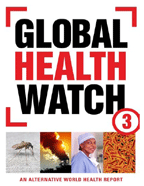Investing in social sectors to enhance health systems
Published on Thu, 2011-10-27 13:20
The successful examples of Sri Lanka, Costa Rica, Rwanda, Thailand, Iran, Brazil and Kerala in India “demonstrate that investment by the state in the social sectors, and particularly in education, health and welfare, has a significant positive impact on the health and social indicators of the whole population”. This is the most relevant conclusion of the third Global Health Watch, conceived as an “alternative world health report” by activists and academics. “A strong, organized demand for government responsiveness and accountability to social needs is crucial in securing healthy public policies,” says the study. This edition of the Global Health Watch, the third after the launched in 2005 and 2008, was co-ordinated by the People’s Health Movement, Medact, Health Action International, Medico International and the Third World Network, member of Social Watch network. There is a “need” of “a coherent vision on health financing predicated on a tax based system that is more sustainable and likely to promote equity and access to health care,” according to the report. The countries set by the study as examples “operate in a global environment where their endeavours are seen as ‘swimming against the current’,” it added. “There is a need to defend these systems, learn from them (and also from their mistakes!) and make this a basis for the articulation of equitable and accessible health systems in other situations across the globe. This requires, apart from national action, global solidarity.” On the other hand, “three of the largest countries in the world – China, India and the US – are clear examples of health systems that are dysfunctional, in large measure owing to unsustainable financing systems”. “The cases are instructive also because they involve two countries (China and India) that are proclaimed the ‘success stories’ of neoliberal economics and the third (the US) is by far the richest country on the globe,” says the report. Health systems of the world are facing “multiple crisis” that include “the three Fs” (financial, food and fuel) and “two ‘slow burn’ crisis” on climate and development, wrote the authors. “For poor and often rural households, the expenditures associated with accessing health services can be catastrophic, and plunge families into poverty, making health care free at the point of use is a vital first step to increasing coverage,” they added. The report warns that “women face the brunt of failing health systems”, characterized by “high maternal mortality and morbidity” and “distressing evidence of the very high cost being paid by women as a consequence of dysfunctional health systems and the neglect of social determinants”. The authors also noted a “very strong presence of the pharma industry” and “a few development countries” at the intergovernmental negotiations on intellectual property and “medical products counterfeiting” being held in the World Health Organization (WHO). “Between 1975 and 2004, only 21 out of 1,556 marketed new chemical entities were indicated for neglected diseases. This represents about 1 per cent of output, a figure unchanged in three decades. MSF estimates that of the $105 billion spent on medical innovation today, 90 per cent is spent on the health problems of less than 10 per cent of the world’s population,” says the report. The inequity is a constant presence in the report. As Dr David Sanders, of the People’s Health Movement, remarked when he launched the report in Rio de Janeiro, Brazil, on Oct. 19: “Why should a Japanese cow enjoy a higher income than an African citizen?” “The report comments on several issues in health systems, three of which stand out,” wrote Margot Lettner, associate of The Wellesley Institute, who was in Rio de Janeiro when the study was launched. “First, the comprehensive vision of primary health care agreed to by WHO Member States in 1978 […] has been replaced by ‘selective’ care and a return to a vertical, medicalized service delivery model that values technical efficiencies rather than root causes – breastfeeding is widely seen to prevent childhood diarrhea, yet food security is not,” she added. “Second, mental health should be viewed in the context of the growing worldwide inequalities that often compromise it – structural problems of inequity, rising consumerism and marginalization of communities. Third, the report argues that present reward-and-review systems often remove research from the concerns of local communities – and the documented benefits of community-based research,” noted Lettner. Source » |
SUSCRIBE TO OUR NEWSLETTER



